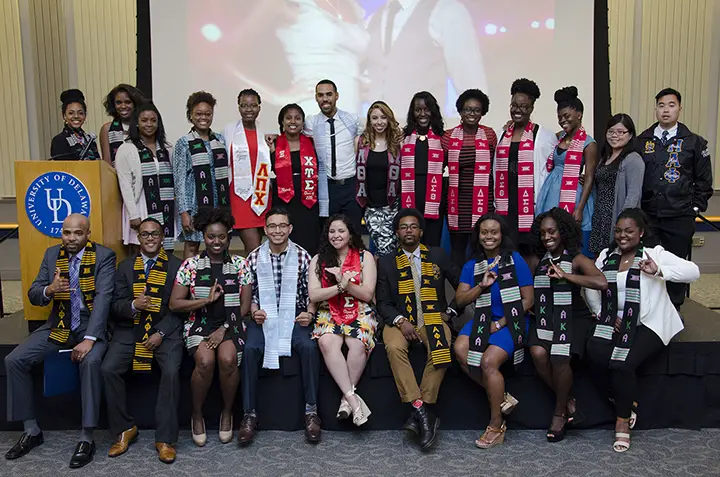The rise of Greek life dominated by historically underrepresented students in higher education is changing commonly held views of the Greek system in American colleges.
The words “Greek life” will inevitably bring to mind images of raucous house parties, endless amounts of cheap liquor and a set of letters from the Greek alphabet never to be found anywhere other than college campuses. However, there is a lesser-known, yet incredibly distinguished, aspect to Greek life on American campuses, collectively known as multicultural Greek life. Multicultural Greek organizations, though not yet part of the mainstream perception of Greek life, have successfully cemented their status as an integral component of the college experience through its inclusion and support of all.
Historically, the rise of multicultural Greek life on college campuses coincided with the rapidly increasing enrollment of students of color, namely Black, Latinx and Asian American students. The emergence of organizations founded with minority students in mind is partly the result of the success of the Civil Rights Movement, which ushered in a transformative new era in the late 20th century for racially underrepresented populations. Following the passage of the Civil Rights Act of 1964, many students from historically underrepresented backgrounds were empowered to become the first in their families to pursue higher education.
The emergence of multicultural Greek organizations also coincided with the wave of immigration of the latter 20th century, which largely drew young people from Africa, Asia and Latin America. Immigration, as well as minority enrollment into institutions of higher education, inevitably increased the growing demand for and necessity of groups dedicated to supporting students of color. Rising rates of immigration, coupled with increasing numbers of students pursuing higher education, have led to fundamental transformations in society, such as increasing tolerance and acceptance of differences in identity, which have gradually made their way into the culture of American college campuses.
Multicultural Greek organizations first arose on American campuses in the 1980s and 1990s, a clear result of increasing numbers of students of diverse backgrounds enrolling in universities nationwide. However, upon arriving on campus, minority students often discovered limited resources intended to guide them to success and provide a strong support network. The exception was a few historically African American fraternities and sororities, collectively known as the Divine Nine. The overall lack of expansion of the Greek scene was not left unnoticed and would quickly provide the transformation the new generation sought.
Growing demand for multicultural Greek organizations in the late 20th century quickly ushered in an era that would transform the lives of many students across the country. In November 1981, Mu Sigma Upsilon Sorority, Inc. was founded at Rutgers University and would cement its permanent status in Greek life as the first multicultural sorority. Mu Sigma Upsilon, Inc.’s arrival onto the Greek scene would pave the way for legions of multicultural organizations to follow in its footsteps.
Aside from the relatively recent phenomenon of multicultural Greek organizations, the process by which they recruit new members is also completely different from that of mainstream Greek organizations. The term “rush week” is common at any American college with an extant Greek system, and for many, the process is one of the most exciting aspects of the first few weeks of college. Though traditional rush is a relatively short process for a lifelong commitment, the process of becoming a member of a multicultural Greek organization is almost always a semester-long commitment. Though the lengthy mandatory process is a strain and may dissuade some prospective new members, the system is designed to unite only those who will commit themselves to the common values of cultural awareness, community service and inclusion.
The process of becoming a member of a multicultural Greek organization lasts several times as long as that of traditional fraternities and sororities. This is because multicultural organizations are almost always much smaller, therefore more tightly-knit, leaving room for more personalized attention and potential to develop deeper connections. In multicultural Greek organizations, developing an unbreakable bond with future brothers and sisters, as well as immersion into the history, values and culture of an organization is extremely important.
An uncommonly known aspect of multicultural Greek life is the secrecy that shrouds the initiation process. Though traditional rush will also inevitably contain secret rituals and processes, the secrecy surrounding initiation into a multicultural Greek organization is the defining aspect of the process. Throughout the semester-long process, prospective new members are forbidden from revealing their status as PNM’s, as well as interact with current members in public, in order to build suspense for their end-of-semester reveal.
The process of becoming an official member of a multicultural sorority or fraternity is a semester-long process that culminates with a new member presentation, sometimes referred to as a “probate,” where new members have the chance to introduce themselves to the university community, as well as brothers and sisters from nearby university chapters. New member presentations will usually feature individual performances in which new members show off their knowledge of their organization’s history and values, as well as perform individual dance routines. New member presentation will usually culminate with a group dance that will present current and new members together in public for the first time.
What sets multicultural Greek organizations apart is their unwavering commitment to raising awareness of and celebrating not only the cultures on which they were founded, but all cultures of which their members represent. The explicit inclusion of all students is especially appealing to first and second generation Americans, and particularly students who identify as biracial or bicultural. Multicultural Greek organizations therefore provide a safe haven for students who may otherwise be without one at their universities.
Throughout America’s history, the country as a whole has learned to, albeit slowly, embrace diversity. In the 21st century, there is no doubt that America is embracing multiculturalism now more than ever before, particularly on college campuses. The rise of multiculturalism in America complements the rise in prominence of multicultural Greek organizations, whose purpose is to value all cultures holistically and to provide an unquestionable platform for students of all backgrounds.

















